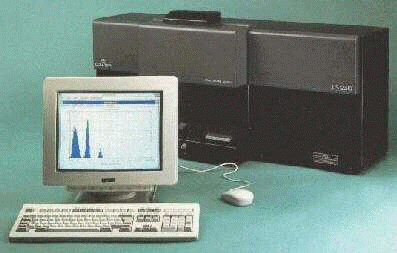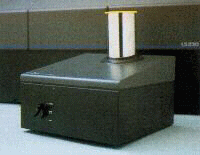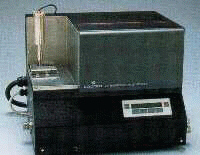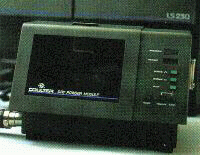The COULTER® LS Series
Laser Technology. High Resolution. Wide Dynamic Range. Walk Away Operation.
Method:
Enhanced Laser Diffraction (LS 100Q, LS 200)
Multi-frequency analysis (LS 230)
Size Range:
LS 100Q 0.40 - 1000 Ám LS 200 0.40 - 2000 Ám LS 230 0.04 - 2000 Ám
With its patented binocular optical system, the Coulter LS series makes an accurate diffraction measurement for the entire particle size range without any lens changes.
The LS Series is very flexible and can handle many different requirements for sample handling and dispersions.
A wide range of sample dispersion modules is available for:- Analysis of small sample quantities -- Micro Volume Modules
- Analysis in aqueous suspensions -- Variable Speed, Small Volume and Micro Volume Modules
- Dry powder analysis -- Dry Powder Module
- Analysis in organic solvents -- Small Volume and Micro Volume Modules
- Patented detector pattern -- 126 optical detectors
- Patented PIDS technology (LS 230) for enhanced resolution of submicron size fraction
The accuracy and resolution of the LS 230 submicron data can best be demonstrated by the analysis of a trimodal latex mix (80, 400 and 2000 nm). The enhanced laser diffraction technique and multi-frequency PIDS technology of the LS 230 can separate and size each individual component.
Particle Size Analysis Is A Very Important Part Of Quality And Process Control.
The size of the particles that make up bulk materials can have profound effects on the characteristics of the end product. It can affect taste; e.g., whether flavors are sweet or bitter depends on particle size. Particle size also determines how well particles go into a solution at a chemical plant or even how many miles you can get from a set of tires. The list is almost endless, but the result of accurate analysis is always the same; vastly improved product.
 |
The Latest In Laser Diffraction Particle Size Analysis Comes From Coulter. The COULTER LS Series is a system of multifunctional particle characterization tools. Its patented state-of-the-art, laser-based technology permits analysis of particles without the risk of missing either the largest or the smallest particles in a sample. The LS technology is based on both the Fraunhofer and Mie theories of light scattering. The LS differs from other laser-based instruments by virtue of its wide dynamic size range, number of size channels and sample measurement options. The LS 200, for example, can measure particle sizes from 0.375 µm to 2000 µm in a single scan using 92 channels. The LS 230 measures particle size from 0.04 µm in a single scan using 116 size channels. The LS Series Utilizes Unique Patented Systems. The LS Series particle size analyzers are the most capable and sophisticated particle size analyzers available on the commercial market today. In fact, many of the sub-systems are so unique they're patented. The LS uses reverse Fourier lens optics incorporated in a patented binocular lens system. This enables the LS to optimize light scattering across the widest dynamic range in a single scan. |
The LS Presents Data In Different Ways To Solve Different Problems.
The results are calculated by diffraction data from either the Fraunhofer or Mie theories which can be presented in a number of ways:
-
Volume % (wt %), surface area % and number % distributions
- Presentations as % greater than and % less than stated size,
- cumulative and differential tables and graphs
-
Complete statistical profiling
- Overlays or sample comparisons of instrument results
- High resolution graphics
- Interpolation for up to 150 operator selectable size-to-%
- Overlays or sample comparisons of instrument results
- or %-to-size conversions
-
Pass/fail analysis of data
- User-customized data formatting
The LS Delivers Excellent Data Reproducibility.
Reproducibility is one of the most important factors in laser diffraction particle size analysis. Tighter product specs allow manufacturers of bulk and particulate materials to have a higher quality product. And while the industry standard for reproducibility is 2%-4% under ideal conditions, the LS Series, typically, has better than 1% reproducibility!
Consider These Key Features.
|
The variable speed Fluid Module provides automatic operation for aqueous-based diluents, in addition to weak acids, bases, glycols and mineral oils. An ultrasonic transducer aids sample dispersion. |

|
|
The Micro Volume Module is a static cell with a total volume of 12 ml of diluent. It has an internal stirring mechanism to keep particles suspended during analysis.

|
The automated Hazardous Fluids Module is designed for flammable diluents such as alcohols, ketones, aldehydes, hydrocarbons, toluene, kerosene, and isopar. A microtip ultrasonic probe with eight power settings is also available. |
|
|
The Dry Powder Module can analyze samples from 0.375 µm to 2000 µm. Standard analysis time is 60 seconds. The Dry Powder Module can analyze both free flowing and non free flowing samples. |

|
|








